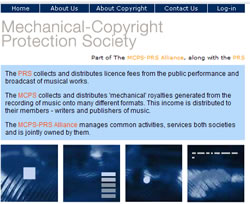 “A wide music industry grouping representing the independent record industry, composers and songwriters, musicians and performers, music managers, music publishers and their collecting societies hosted a crucial round table meeting yesterday, chaired by the Smith Institute, to debate the creation of a progressive and innovative copyright framework that is fit for purpose in the digital age.”
“A wide music industry grouping representing the independent record industry, composers and songwriters, musicians and performers, music managers, music publishers and their collecting societies hosted a crucial round table meeting yesterday, chaired by the Smith Institute, to debate the creation of a progressive and innovative copyright framework that is fit for purpose in the digital age.”
Which is the official line anyway, whether it has any relevance to the real world is a mute point and potentially completely misunderstood.
After the “industry” round table, a press conference was held, with the following representatives: –
Adam Singer (Chief Executive MCPS PRS Alliance) (below right), Alison Wenham (Chairman, Chief Executive, AIM) Dave Rowntree (Drummer with Blur + Ailerons) Andy Heath (Managing Director 4AD Music, British Music Rights Board) David Ferguson (Chairman, British Academy of Composers & Songwriters) Doug D’Arcy (AIM Board, Managing Director Songlines) Horace Trubridge (Assistant General Secretary Musicians Union) Jazz Summers (Chairman Music Managers Forum, CoFounder Big Life Management)
A value recognition right
This is the whole premise of their argument. Anyone involved in the distribution of content (whether they are aware of it or not) should be considered part of the value chain and therefore subject to licensing constraints.
 The Copyright Levy laws were designed for analogue, but digital changes everything, control has passed to other players (ISPs, mobile operators, iPods etc) rather than traditional channels with physical controls. So the intent is to license these distributors. This will of course require working with them, understanding their business models etc.
The Copyright Levy laws were designed for analogue, but digital changes everything, control has passed to other players (ISPs, mobile operators, iPods etc) rather than traditional channels with physical controls. So the intent is to license these distributors. This will of course require working with them, understanding their business models etc.
It’s all about a mechanism for creating a better working relationship with distribution channels.
The groups are already lobbying government to change the law so that these new distribution channels will now be considered actual distributors as the content is adding value to the distributor, therefore the industry should get a cut of the added value.
It’s estimated that £0.5 billion has been lost in license revenues due to illegal sharing. Current copyright law actually forbids copying a CD to iPod (or any other kind of digital copy).
They agree there is more work to do and they’ll publish the report in September including transcripts of discussions held yesterday morning.
 These issues don’t just apply to the music industry and they’re gaining traction from other content industries and internationally.
These issues don’t just apply to the music industry and they’re gaining traction from other content industries and internationally.
Statistics are everything
One of the major stats used to justify their argument is that 60% of Internet traffic is file sharing, initially it was stated that this was “music sharing”, but this was changed to general sharing. There is a lot of P2P traffic and though a lot of it is probably music sharing, services such as Skype and other legal P2P services will also make up a good percentage.
They then utilise these figures that as so much traffic is P2P, users are signing up for broadband because of file sharing i.e. P2P is adding value and therefore attracting users and they want a cut of the added value.
It’s actually probably the other way around, people sign up for broadband for many reasons. Nowadays, because it’s given away free as a bundle with other services, but also because it’s cheaper than (or near enough the same price as) dial-up. Customers then find P2P is easy and therefore use it.
The margins on broadband are extremely low, Carphone Warehouse (CW) is actually losing money on every customer they sign-up, EVERY month (this will eventually change when they install their own kit in BT’s exchanges). They are buying market share. P2P doesn’t help their situation at all, they’d much rather not have users eating up all CW’s bandwidth which costs them lots of money.
 Bulldog have just pulled out of the retail market and have decided to concentrate on the wholesale side and compete with BT Wholesale. Though part of this is that their parent Cable and Wireless (C&W) are trying to consolidate to fewer larger customers (i.e. broadband suppliers who then have lots of customers), part of the problem with having retail customers is you have to constantly upgrade your network to meet their growing bandwidth needs, and this gets very expensive very quickly.
Bulldog have just pulled out of the retail market and have decided to concentrate on the wholesale side and compete with BT Wholesale. Though part of this is that their parent Cable and Wireless (C&W) are trying to consolidate to fewer larger customers (i.e. broadband suppliers who then have lots of customers), part of the problem with having retail customers is you have to constantly upgrade your network to meet their growing bandwidth needs, and this gets very expensive very quickly.
With a wholesale customer base, they only need to provide a certain amount of bandwidth per customer to the retailer, who then has to provide connectivity elsewhere and meet the growing bandwidth requirement pains.
Retailers using BT Wholesale have very small margins, equating to maybe a few pounds per month to provide all the back-end services that customers demand.
Broadband to all
Broadband is becoming a commodity and it’s the value added services that will generate revenue, and what are the value add services? Licensed content, initially likely to be TV (as in IPTV), but other services will follow.
In France broadband is available for 18 Euros per month for 24Mb/s ADSL2+, this includes Internet access, basic TV channels and all you can eat national French dialing. Yes, the companies support P2P, not because they want to, but because customers demand it. The basic service will just about pay for itself, or even make a loss, but then once customers have the broadband in place, they buy premium content and that’s where revenue comes in.
 This model is coming to the UK, BT’s broadband hub service is their first foray into an IP connected world, BT Vision (IPTV) is coming.
This model is coming to the UK, BT’s broadband hub service is their first foray into an IP connected world, BT Vision (IPTV) is coming.
Stealth Tax
The music industry has gotten very bad press for suing consumers, so now they are trying to make the problem go away by taxing (licensing) the distribution channels and hiding the effect from users themselves.
The distribution channels would rather the traffic wasn’t on their networks in the first place, but are being put in a position (which could be driven through by law) where they have to pay for their users’ (mis)use of the network where margins are incredibly low to start with.
This means the channels will have to put up pricing (which means users notice) or absorb the costs themselves and they make even lower margins.
The music industry needs to rapidly have sensible discussions with the ISPs and other distribution channels to sort out the real economics of distribution or it’s likely a stealth tax will come into force which could kill the distribution industry in doing so, which wouldn’t benefit anybody.
 We’re getting very excited by what we’ve seen of mobiBLU’s new ultra, ultra-slim US2 media player.
We’re getting very excited by what we’ve seen of mobiBLU’s new ultra, ultra-slim US2 media player. Similarly, we’ve no details about the specifics of the advertised “Audio, Video, Photo support,” but we can guess that it plays back MPEG4 files and can display JPEGs.
Similarly, we’ve no details about the specifics of the advertised “Audio, Video, Photo support,” but we can guess that it plays back MPEG4 files and can display JPEGs. Last week the French legislature approved a new law which could radically change the landscape of digital audio. The so-called ‘iTunes Law’ is designed to break the control hardware manufacturers exert over the type of content that can be played by their digital music players and software. The result would be that companies such as Apple, Microsoft and Napster would have to make their data formats interoperable, thereby opening their systems to music from rivals. A regulatory body could be set up to police the sector.
Last week the French legislature approved a new law which could radically change the landscape of digital audio. The so-called ‘iTunes Law’ is designed to break the control hardware manufacturers exert over the type of content that can be played by their digital music players and software. The result would be that companies such as Apple, Microsoft and Napster would have to make their data formats interoperable, thereby opening their systems to music from rivals. A regulatory body could be set up to police the sector.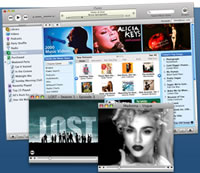 The iTunes Law does, however, leave a get-out for the tech companies. A newly-added clause permits artists to exercise control over additional DRM. In short, artists could object to their music being transferred into other formats, thereby ensuring that current practices could continue unaffected. This loophole would require renegotiation of existing contracts, something Apple et al may wish to avoid given record companies’ desire to recoup perceived losses due to piracy. Lawyers observed that the new law is complex and its impact will be difficult to judge until it is tested in court.
The iTunes Law does, however, leave a get-out for the tech companies. A newly-added clause permits artists to exercise control over additional DRM. In short, artists could object to their music being transferred into other formats, thereby ensuring that current practices could continue unaffected. This loophole would require renegotiation of existing contracts, something Apple et al may wish to avoid given record companies’ desire to recoup perceived losses due to piracy. Lawyers observed that the new law is complex and its impact will be difficult to judge until it is tested in court. UK British music recording industry trade association, the BPi, has today issued a statement that they have “successfully jumped the first hurdle in its battle to have unauthorised Russian download site AllofMP3.com declared illegal.”
UK British music recording industry trade association, the BPi, has today issued a statement that they have “successfully jumped the first hurdle in its battle to have unauthorised Russian download site AllofMP3.com declared illegal.” The argument of the BPI is that AllofMP3 has no right to be selling the music, as they aren’t licensed to do so. AllofMP3 counter that they are “authorized by the license # LS-3М-05-03 of the Russian Multimedia and Internet Society (ROMS) and license # 006/3M-05 of the Rightholders Federation for Collective Copyright Management of Works Used Interactively (FAIR).”
The argument of the BPI is that AllofMP3 has no right to be selling the music, as they aren’t licensed to do so. AllofMP3 counter that they are “authorized by the license # LS-3М-05-03 of the Russian Multimedia and Internet Society (ROMS) and license # 006/3M-05 of the Rightholders Federation for Collective Copyright Management of Works Used Interactively (FAIR).”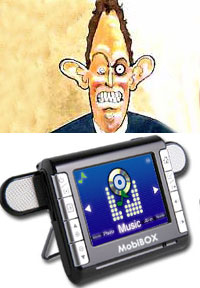 Smaller than a pack of cards and packed with enough whizz-bang functionality to keep a hyperactive cokehead entertained for hours, MobiBox’s new MP410 multimedia recorder and player packs a big punch for the price.
Smaller than a pack of cards and packed with enough whizz-bang functionality to keep a hyperactive cokehead entertained for hours, MobiBox’s new MP410 multimedia recorder and player packs a big punch for the price. The MP410 also features a pair of folding out speakers for added ‘Tony Blair’ appeal, and comes with a pull-out stand for desk viewing.
The MP410 also features a pair of folding out speakers for added ‘Tony Blair’ appeal, and comes with a pull-out stand for desk viewing.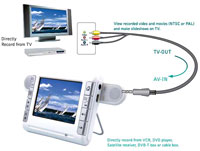 Interface 2 in 1 MiniUSB (USB 2.0/power in)
Interface 2 in 1 MiniUSB (USB 2.0/power in) Lined up on the new product runway and awaiting clearance for take off is the slick looking Oracom UB890 portable media player.
Lined up on the new product runway and awaiting clearance for take off is the slick looking Oracom UB890 portable media player. There’s also built in equaliser and 3D sound and onscreen visual effects to keep the easily-bored entertained.
There’s also built in equaliser and 3D sound and onscreen visual effects to keep the easily-bored entertained. Rounding off the gadget-fest, there’s also an alarm clock, sleep timer, built-in speakers (500mW + 500mW) and an iPod-esque ‘Touch Sensor Key Pad’ for shimmying through the menus.
Rounding off the gadget-fest, there’s also an alarm clock, sleep timer, built-in speakers (500mW + 500mW) and an iPod-esque ‘Touch Sensor Key Pad’ for shimmying through the menus. We’re frequently impressed with the observations of Marc Freedman from
We’re frequently impressed with the observations of Marc Freedman from 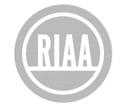 As illustrated, average weekly sales during the first four-week periods of 2006 decline from 17.56 million units/week in the 1st period to 16.68 million units/week in the 4th period (a drop of .9 million units or 5.1%). Compare this to average weekly sales for the first four-week periods of 2005 when average weekly sales grew from 7.38 million units/week in the 1st period to 8.73 million units/week in the 4th period (an increase of 1.4 million units or 18.3%).
As illustrated, average weekly sales during the first four-week periods of 2006 decline from 17.56 million units/week in the 1st period to 16.68 million units/week in the 4th period (a drop of .9 million units or 5.1%). Compare this to average weekly sales for the first four-week periods of 2005 when average weekly sales grew from 7.38 million units/week in the 1st period to 8.73 million units/week in the 4th period (an increase of 1.4 million units or 18.3%). Digital music sales rose to a point where they essentially offset the decline in CD sales in 2005. (Bainwol was right on that point, but that was for last year.) With the hypergrowth behind it, digital music sales can no longer make up for the hemorrhaging of physical music sales nor will it return the music industry to its prior glory days.
Digital music sales rose to a point where they essentially offset the decline in CD sales in 2005. (Bainwol was right on that point, but that was for last year.) With the hypergrowth behind it, digital music sales can no longer make up for the hemorrhaging of physical music sales nor will it return the music industry to its prior glory days. Unlike the transition from albums to CDs or video tapes to DVD, ‘going digital’ is not a simple format media transition. The use of digital technologies and the Internet has and will continue to fundamentally change how entertainment is created, stored, distributed, and consumed. Technology has undermined the entertainment industry’s pretense of control despite its best efforts.
Unlike the transition from albums to CDs or video tapes to DVD, ‘going digital’ is not a simple format media transition. The use of digital technologies and the Internet has and will continue to fundamentally change how entertainment is created, stored, distributed, and consumed. Technology has undermined the entertainment industry’s pretense of control despite its best efforts. There’s mutterings of some discontent around MySpace, the insanely popular social site.
There’s mutterings of some discontent around MySpace, the insanely popular social site.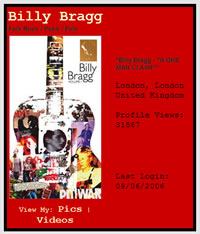 The original Bragg posting was made back in mid-may, but was highlighted when it was picked up by the
The original Bragg posting was made back in mid-may, but was highlighted when it was picked up by the 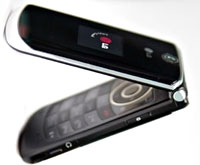 LG has unveiled the KG810 clamshell phone; a super slim, quad band GSM handset which will be sold in Asia, China, Europe and CIS markets.
LG has unveiled the KG810 clamshell phone; a super slim, quad band GSM handset which will be sold in Asia, China, Europe and CIS markets.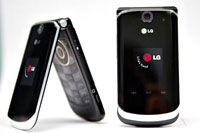 Under the screen there’s a touch-sensitive keypad and a fairly healthy 128 MB of internal memory.
Under the screen there’s a touch-sensitive keypad and a fairly healthy 128 MB of internal memory. Although these stars were clearly happy to scoop up any expensive freebies coming their way, when it came to electing the UK’s “primary Chocolate phone ambassador,” LG found the celebrity cupboard somewhat bare.
Although these stars were clearly happy to scoop up any expensive freebies coming their way, when it came to electing the UK’s “primary Chocolate phone ambassador,” LG found the celebrity cupboard somewhat bare. After consulting the well thumbed iPod design book, Chinese electronics manufacturers Meizu have rolled out their new Meizu Mini, a truly Lilliputian Personal Media Player.
After consulting the well thumbed iPod design book, Chinese electronics manufacturers Meizu have rolled out their new Meizu Mini, a truly Lilliputian Personal Media Player. Other onboard gizmos include Synchronized Lyric Display, E-book, alarm clock, calculator, calendar and some (unspecified) games.
Other onboard gizmos include Synchronized Lyric Display, E-book, alarm clock, calculator, calendar and some (unspecified) games. So far we’ve only seen Chinese language screen shots but the interface seems crisp and slick enough to us.
So far we’ve only seen Chinese language screen shots but the interface seems crisp and slick enough to us. The player comes with a white or black finish and a metal back just like the – yep, you’ve guessed it – iPod.
The player comes with a white or black finish and a metal back just like the – yep, you’ve guessed it – iPod.